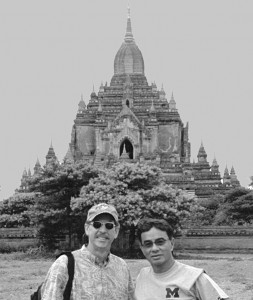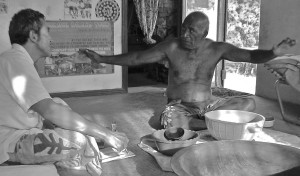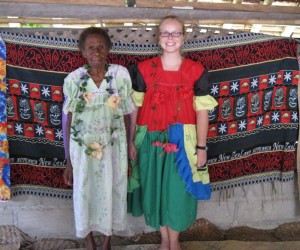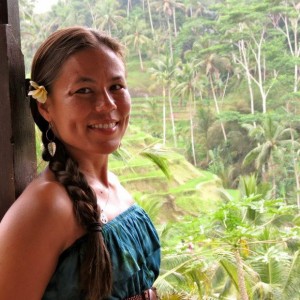Last week, Kapiʻo posted an overview of the various Anthropology courses offered here at KapCC. If you missed that, you can find it here. Also mentioned in the article were the various applications of anthropology and their relevance to the rest of society, and in particular, to Hawaiʻi. Unfortunately, we were not able to introduce members of KapCC’s anthropology team in this first article, but here they are now. All biographies, pictures, and captions are courtesy of Dr. Carl Hefner.
Carl Hefner, Ph.D. is Professor of Anthropology, Discipline Coordinator for Anthropology, and Department Chair of the Social Sciences in the Arts and Sciences Division at Kapiʻolani Community College. He has conducted fieldwork and traveled in Indonesia, Malaysia, Thailand, Laos, Cambodia, Vietnam, Singapore, Japan, China and Myanmar. Hefner is fluent in Indonesian, and has also conducted numerous tours throughout Southeast Asia, including taking students down the Mekong River through seven countries. His dissertation fieldwork was conducted in the villages near Surabaya, East Java, where he conducted research on ethnomusicology and Indonesian theater. From 2011-2012 he designed curriculum and trained Indonesian Administrators in the area of how to establish and setup community colleges in Indonesia under the auspices of the Education and Cultural Affairs Division of the Department of State.

Carl Hefner and UHM Asian Studies Chair Dr. Michael Aung-Thwin traveled together to conduct field research in Burma (Myanmar) over a 7-year period, resulting in a publication known as the Making of Modern Burma.
Guido Carlo Pigliasco, Ph.D. is Adjunct Assistant Professor of Anthropology at the University of Hawai‘i at Mānoa, and joined the Department of Social Sciences at KapCC in 2010. He has practiced international law, and has been a contributor to Italian newspaper il Giornale and Mediaset, Italy’s largest commercial broadcaster, which in the mid 1990s has written 10 documentary films on contemporary Oceania. His ethnographic novel Paradisi Inquieti came out in 2000. His long-term work in the Pacific is mainly based on fieldwork in Fiji where he authored “Na Vilavilairevo”, a monograph on firewalking in Fiji and Oceania for the Fiji Museum (2009), and directed “A Ituvatuva Ni Vakadidike E Sawau” (The Sawau Project), a multimedia project under a grant from the iTaukei Institute of Language & Culture in Suva (2005). He is currently working on a co-edited supplementary textbook for introductory courses in socio-cultural anthropology forthcoming from University of Hawai‘i Press. Combining academic with applied work, his current research and publications focus on Pacific Islanders’ rights in intangible cultural heritage.

Guido Carlo Pigliasco, Dakuibeqa, Beqa Island, Fiji, 2005, interviewing traditional knowledge custodian Manua Laveta.
Ashley Vaughan, Ph.D. in Anthropology from the University of Hawai‘i at Mānoa. A medical anthropologist, her research focuses on indigenous health, the intersections of medical traditions, and how religion articulates with medical ideology. Based on 13 months of ethnographic research financially supported by the National Science Foundation, Dr. Vaughan’s doctoral work examined how people in Tautu, Vanuatu (South West Pacific) incorporate the global flows of biomedicine and Christianity into their local knowledge structures and medical practices. In the classroom Dr. Vaughan draws on her in-depth knowledge of Vanuatu, Hawai’i and other Pacific island cultures as well as the application of anthropology to health interventions to demonstrate the value of anthropological perspectives.

Ashley Vaughn’s dissertation research examined how people in Tautu, Vanuatu (South West Pacific) incorporate the global flows of biomedicine and Christianity into their local knowledge structures and medical practices.
Jamie Nakama, M.A. in anthropology from UH Mānoa, with a specialization in ecological anthropology and a focus on Hawaiʻi and the Pacific. As a deeply passionate educator, she takes great pride in teaching anthropology as a means to promote cultural diversity, critical thinking, and open-mindedness. Jamie is a member of the KapCC Faculty Senate committee on Sustainability at KapCC, which is implementing sustainability-related courses across the curriculum. Her anthropology courses have a strong place-based and environmental/sustainability focus. Besides teaching Anth 151 at KapCC, Jamie is the Education Program Manager at the Hawaiʻi Nature Center, a local non- profit dedicated to hands-on, outdoor environmental education for children. In her spare time, Jamie is a dancer and capoeira instructor.

Jamie Nakama in Bali, Indonesia.
Ulla Hasager, Ph.D. is the Civic Engagement Specialist for the College of Social Sciences, University of Hawaiʻi at Mānoa. She has taught Ethnic Studies at UHM since 1996 and Anthropology at Kapiʻolani Community College since 1999. Dr. Hasager’s areas of research includes historical anthropology, human and environmental rights with a focus on indigenous peoples and ethnic groups of the Pacific, ethnic identity and education – and she is one of the leaders in Hawaiʻi promoting the pedagogy of service learning in institutions of higher education. She works with students, faculty, administrators, and community partners to expand the level of civic engagement in higher education and the community. Among several innovative civic-engagement initiatives, she leads the Pālolo Pipeline Program (PPP – an umbrella and model program, coordinating a number of projects and partners in Pālolo Valley (including surrounding institutions of higher education) aimed at improving educational opportunities for the low-income, immigrant/native community of the valley. She is also program coordinator (with Professor Nelda Quensell of KapCC) of the cultural-environmental Mālama I Nā Ahupua’a Service-Learning Program aimed at creating a sense of place and civic responsibility among students. Both programs have strong sustainability and STEM components. Dr. Hasager was raised in Denmark but now lives in Kane’ohe with her extended Kanaka Maoli family.
Jonathan D. Baker, Ph.D. in medical anthropology from UHM in 2008. His research examines the overlap of biology and culture in a number of contexts. He studies the health consequences of human diet and nutrition, and also specializes in the evolutionary and social impacts of infectious disease. His Ph.D dissertation examined the controversy about the safety of ʻawa, and the ways globalization and commodification are transforming kava’s use. He continues to study kava in collaboration with researchers at Chaminade University, as a part of the NSF Hawaii EPSCoR Program. He is a lecturer and adjunct professor in the Department of Anthropology at the University of Hawai‘i at Mānoa, and a lecturer in the Department of Social Sciences at Kapi’olani Community College.
